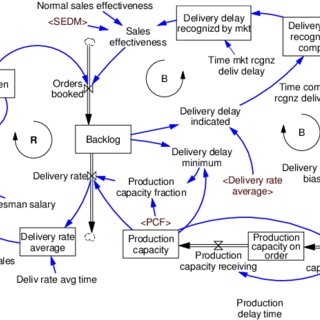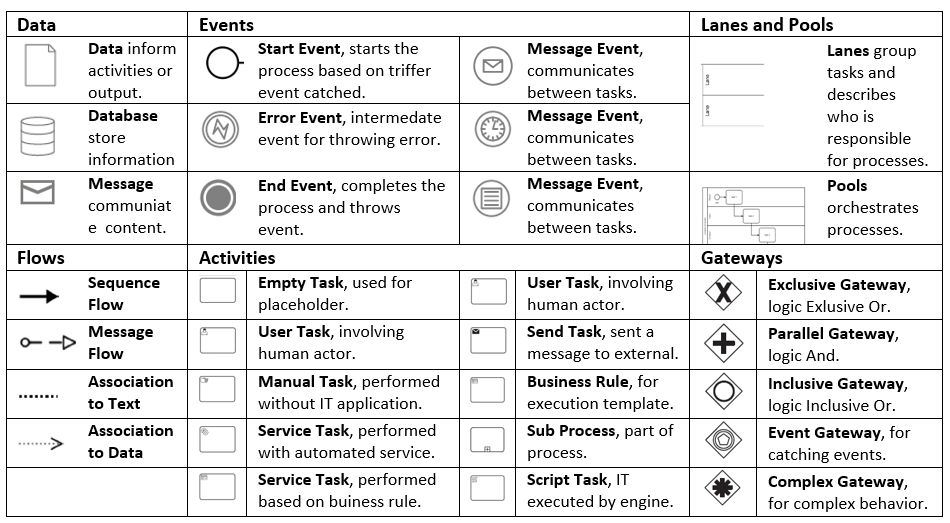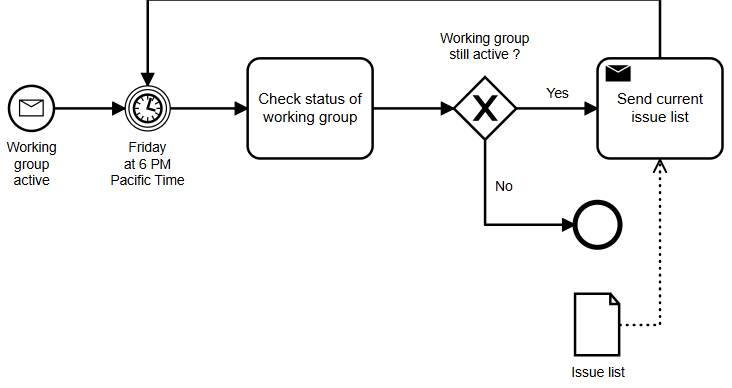Analytics, Simulation and Automation are critical for enhancing quality of decision-making in Business Process Management, to enable reducing costs and boosting performance in organizations.
Performance and conformance of processes is suitably evaluated with Process Analytics resulting in the delivery of timely insights about how an organisation works and what bottlenecks exists in services and products. Simulation of Processes demonstrates how the process works under multiple scenarios to provide important insights for successful change management. Specification and documentation of Business Processes using the industry standards of Business Process Modeling Notation (BPMN) and Decision Modeling Notation (DMN) increases the transparency of processes within an organization to enable process automation.
Auriscon supports end-to-end across a range of topics covering:
| Process Mapping |
Process Design & Documentation |
Process Performance | Process Conformance | Process Mining | Process Simulation | Process Change |
Process Analytics suitably utlizes evidence that has been identified in the process data.to make transparent any gaps between what management oversees holistically and what specialists and employees know about the process. The evaluation of the performance of Business Processes is a crucial aspect subject to scrutiny as part of Process Analytics.Based on appropriate performance measures the identification of bottlenecks in the processes is possible.
With our support organisations secure support in evaluating the efficiency of their processes. Our services in Process Analytics and Process Mining allow to evaluate a range of topics and questions to support any successful Business Process Management..
→ Read More ...
Simulation of Processes uncovers behaviour of processes under a range of market conditions to enable adaption to changing business environments. Simulation of process dynamics prior to go live demonstrates how the process works under anticpated external factors and market trends to enable successful Strategy Management.
Specification and Documentation of Business Processes using Business Process Modeling Notation (BPMN) and Decision Modeling Notation (DMN) establishes ISO standard and supports Process Automation. Intuitive as this industry standard is it can be understood by all parties, from process owners and business analysts to software developers and data architects.
Example Process Map of Traffic Fines Process
Business Process Analytics
Insights gained from Process Analytics provides support for any effective Business Process Management. The evaluation of process performance and conformance of processes is a critical aspect as part of Process Analytics. With our support organisations secure support in evaluating the efficiency of their processes. Our services in Process Analytics and Process Mining allow to evaluate a range of topics and questions to support any successful Business Process Management.
|
Auriscon supports: |
|
|
|
|
|
|
|
Simulation of Process Dynamics
Simulation has proven to be a suitable approach to evaluate process and system behaviour. Through simulation of worthwhile insights about limitations of business processes and performance gaps are obtained. Examples include verifying assumptions of planned process changes prior to go live or demonstrating the process behaviour under limiting conditions. In particular the simulation approach supports change management in evaluating alternatives in process details and ressource allocations in a cost effective way.
|
Auriscon supports: |
|
|
|
|
|


Specification and Documentation of Business Processes
Business Process Modeling Notation (BPMN) is the commonly accepted standard to spedify and document business processes. BPMN is an open standard suitable to define business processes and control workflows.As an industry standard BPMN can be understood by all parties, from process owners and business analysts to software developers and data architects.
Decision Model and Notation (DMN) is a standardized notation for modeling decisions in business processes. Similar to BPMN, DMN is developed and maintained by OMG® (Object Management Group) to provide a credible standard across various industries.
Decision Requirements Diagram (DRD) provide a visual representation of the DMN model. The DRD is graphically displaying nodes and input data to define the course grained structure of any decision logic. Finally, decision nodes in the diagram are underpinned by decision tables that tabulate one or more business rules.
BPMN and DMN together render a low-code structure with sufficient transparency to allow a common understanding for participants across business and IT, and to provide a suitable basis for Business Process Automation.
|
Auriscon supports: |
|
|
|
|
BPMN Icons

BPMN Control Flow

DMN Icons

Our support:
Auriscon consultants can support on-site or by working remotely based on flexible allocations. We collaborate effectively with functional teams and stakeholders to assist in reaching your project goal. Our aim is to support and advise towards a succesful project outcome whilst bringing relevant skills to any client's projects.
- We confidentially deal with methodological concepts and analytical models.
- We draw on business insights to deliver useful solutions.
- We advise on industry standards
We support end-to-end by utilizing analytical methods to transform data into insights and detecting weaknesses in processes. Contact us to request further details on how we can support in levering your processes across the time, cost and quality dimensions.
→ Contact
